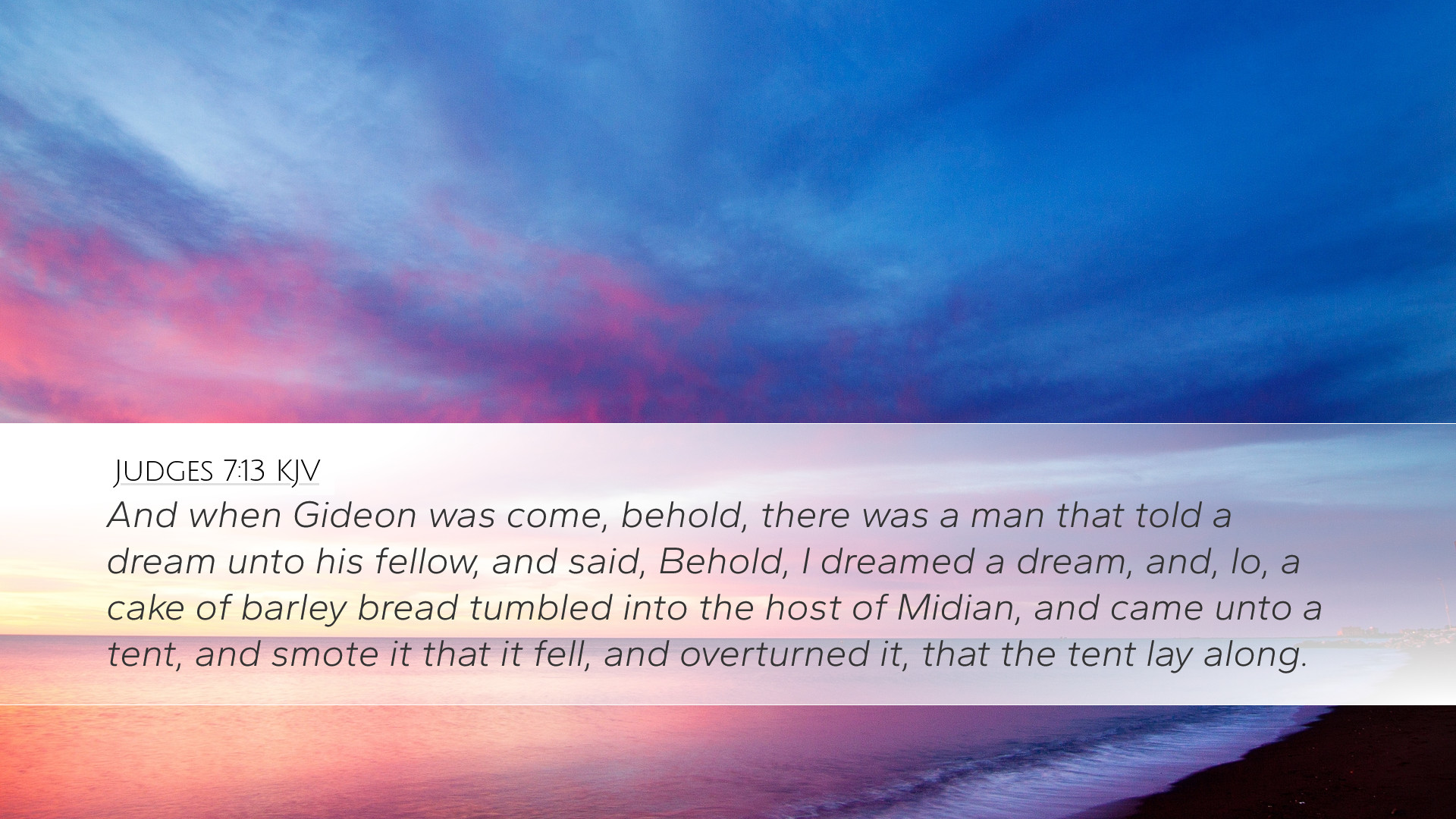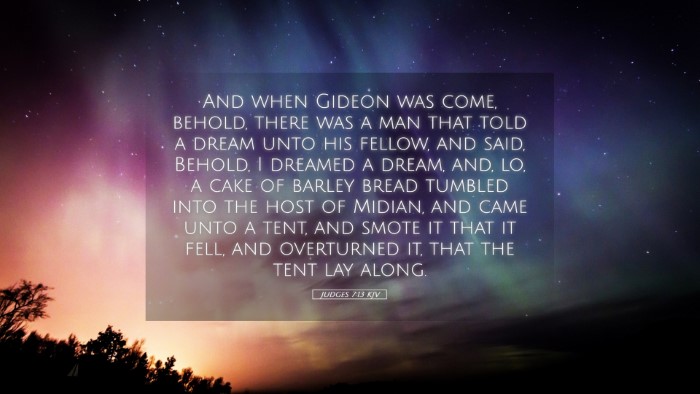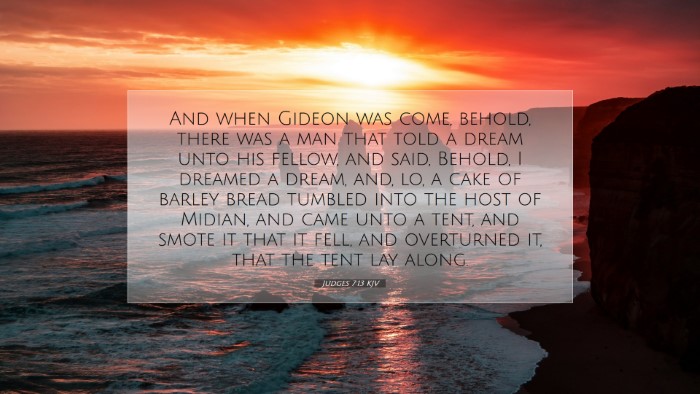Old Testament
Genesis Exodus Leviticus Numbers Deuteronomy Joshua Judges Ruth 1 Samuel 2 Samuel 1 Kings 2 Kings 1 Chronicles 2 Chronicles Ezra Nehemiah Esther Job Psalms Proverbs Ecclesiastes Song of Solomon Isaiah Jeremiah Lamentations Ezekiel Daniel Hosea Joel Amos Obadiah Jonah Micah Nahum Habakkuk Zephaniah Haggai Zechariah MalachiJudges 7:13
Judges 7:13 KJV
And when Gideon was come, behold, there was a man that told a dream unto his fellow, and said, Behold, I dreamed a dream, and, lo, a cake of barley bread tumbled into the host of Midian, and came unto a tent, and smote it that it fell, and overturned it, that the tent lay along.
Judges 7:13 Bible Commentary
Commentary on Judges 7:13
Judges 7:13 states: "When Gideon arrived there, he overheard a man telling his friend about a dream. He was saying, ‘I had a dream! A round loaf of barley bread came tumbling down into the Midianite camp. It struck the tent with such force that the tent overturned and collapsed.’" This verse is pivotal in the narrative of Gideon, showcasing the interplay between God’s sovereign guidance and human actions.
Contextual Background
At this point in the Book of Judges, Gideon leads the Israelites against the Midianites, who have oppressed them for seven years. The preceding chapters provide insight into the spiritual state of Israel and God's call for deliverance through Gideon. This psychological warfare revealed through a dream highlights God's providence and the assurance He provides to His chosen leaders.
The Significance of Dreams
Dreams serve as a recurring theme in Scripture, often portrayed as a medium through which God communicates. Here, the dream of a barley bread loaf symbolizes God’s impending victory over the Midianites. In biblical times, barley was a staple of the poor, used to represent insignificance. The choice of barley bread as a central symbol indicates that God can use what is deemed weak to achieve great things.
Insights from Matthew Henry
Matthew Henry underscores that the dream signifies not only a divine revelation but also serves to bolster Gideon’s faith. He writes: “Gideon, at the end of his doubts and fears, receives confirmation from the enemy himself.” This notion implies that God’s affirmation may come from the most unexpected sources, often leading to the realization of His power at work in the lives of His people.
Perspectives from Adam Clarke
Adam Clarke elaborates on the symbolism of the loaf: “A round loaf of barley bread, which rolled into the camp of the Midianites, represents the people of Israel, who appeared weak and despised in their own eyes, yet were destined to produce a tremendous impact on their oppressors.” This illustrates the transformative power of God, bringing triumph from perceived weakness.
Albert Barnes’ Interpretation
Albert Barnes provides a perspective on the psychological warfare at play. He comments on the fear that gripped the Midianite soldiers upon hearing this dream. Barnes notes that “the interpretation of the dream lends itself to the encouragement of Gideon, as it gives him divine assurance of the imminent victory.” Thus, even amidst fears, God orchestrates events that lead to His purposes being fulfilled.
The Role of Faith and Obedience
This verse not only captures the pivotal moment of divine affirmation but also signifies the essential role of faith and obedience in the believer's journey. Gideon's dilemma mirrors that of many seeking to follow God’s call—balancing doubt with divine assurance. Gideon overhearing the interpretation of the dream provides encouragement not just to himself but also potentially to the entire Israelite camp.
Application for Today’s Believers
- Recognition of God’s Sovereignty: Believers are reminded that God works through various means to reveal His plans and reassurances to us.
- The Power of Insignificance: Just as the barley loaf signifies God’s use of the weak, Christians are encouraged to understand that their apparent limitations do not hinder God’s capacity to accomplish His purposes.
- Inevitability of Divine Victory: The narrative encourages faith in God’s ultimate triumph over the enemies of His people, regardless of the circumstances.
Conclusion
Judges 7:13 encapsulates a profound moment where God solidifies the foundation of Gideon’s leadership through an unexpected source. The shared dream serves to embolden Gideon and exemplifies the linking of divine providence and human reliance on faith. As such, this verse is not merely historical; it acts as a spiritual touchstone for contemporary believers, urging them to trust in God’s plans and recognize His active role in their lives.


